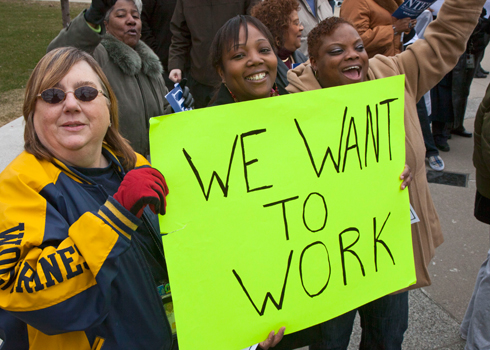As the final deadline approaches for Republicans and Democrats to reach a deal to avert a government shutdown, federal employees across the country are scrambling to figure out contingency plans.
The impact of the looming shutdown on the average federal worker can sometimes get lost in the minute-to-minute political debate on the Hill. So TPM reached out to federal employees to find out how the process was going. Based on the messages we got back, things seem pretty chaotic.
“It’s basically like headless chickens, on fire, in a train, also on fire, careening towards a cliff, on fire,” wrote one TPM reader who works in the “executive offices of a significant government agency.”
The reader said “stress levels this week have been off the chart” and that preparations for shutdown “have almost totally derailed any possibility of doing real business and nobody seems able to talk about anything else anyway.”
“Quite honestly the whole thing has been a bit chaotic,” one government contractor wrote. “Because of the uncertainty around whether there would actually be a shutdown or what would happen if there was, no one knew what to do other than to just keep doing their jobs.”
“It pisses me off because I will be burning my leave/vacation time while the GOP plays games trying to score points with its constituencies,” they added.
Another contractor spoke of similar “madness” at their workplace.
“They are just telling everyone to prepare not to be here on Monday. But it’s crazy because no one can use government computers or Blackberries to send out communications, so how are people supposed to know?” they wrote.
A contract worker at a federal research agency wrote that none of the contract employees who work in their animal labs have been notified of their “essential” status, leading to concern for the creatures in their care.
“There have also been rumors that only 1/3 of the labor requested by vets and facility managers will be permitted to work, and that only ‘essential’ tasks will be permitted,” they wrote. “I’m trying my best not to be cynical, but it’s starting to feel like a lot of animals will be put at risk by this shutdown as well.”
Other spoke of the emotional toll the uncertainty was taking on them and their staff.
“There is a great deal of concern about how junior staff will fare during the shutdown,” one Democratic Hill official wrote. “Senior staff were in tears about it at a staff meeting.”
They added that workers “are very emotional and angry and frustrated with the concessions (other) Dems have already made.”
Another House staffer wrote that the most frustrating part is that all but a couple of members can affect the end result: “It’s all Boehner and Reid at this point. The rest of us are just sitting and waiting.”
A National Guard employee said “basically it’s like election night, except not any fun” and said he was “just sitting here watching websites for updates.”
For some working in low-paying positions, even a temporary loss of income could be tough.
An AmeriCorps VISTA (Volunteer In Service to America) wrote that they and “young people like me are working all over the country doing things like helping Habitat build houses, tutoring students, creating systems to better nonprofit programs, and cleaning up neighborhoods. We’re working in exchange for a stipend that keeps us at the federal Poverty level — right around $760 a month.”
“If the federal government shuts down, how are we going to pay our bills? It’s not like you can have a huge emergency fund on a poverty wage. And we’re barred by the federal regulations of our programs from seeking other employment,” they wrote. “I get that the budget crisis is bad but my landlord still wants to get paid.”
For couples who are both paid by the government, the effect of the shutdown would be compounded. A shutdown “will really send us backwards” wrote a federal contractor, who said that she and her husband spent months working on paying debt which was generated when a husband (now also a federal contractor) was unemployed four years ago.
“The lack of one paycheck will be devastating, as we will need to resort to create more credit card debt to pay for all the things we need to,” she wrote.
Another couple who both get paid by the government could be delayed in purchasing a new home if the shutdown happens.
“My husband and I are trying to buy our first home right now and are in the middle of escrow. We are very worried about receiving our paychecks since we have both been furloughed (I’m a third party contractor and he is a government employee),” she wrote. “Obviously, we would be personally devastated if our first home purchase is derailed by a pro-longed shutdown. Also, we live in DC, so our trash is going to be piling up. We rent right now and don’t have a dumpster… so it’s going to start to smell bad, fast.”
Plenty of employees were frustrated, but others said they’d come to expect it.
“This is the price we pay for the benefits of being a federal employee,” one employee told TPM. “We know that at the end of this, we’re coming back to a job, and we’re probably going to be paid to not work. Too many people right now don’t have that guarantee – and they’re being ignored.”









